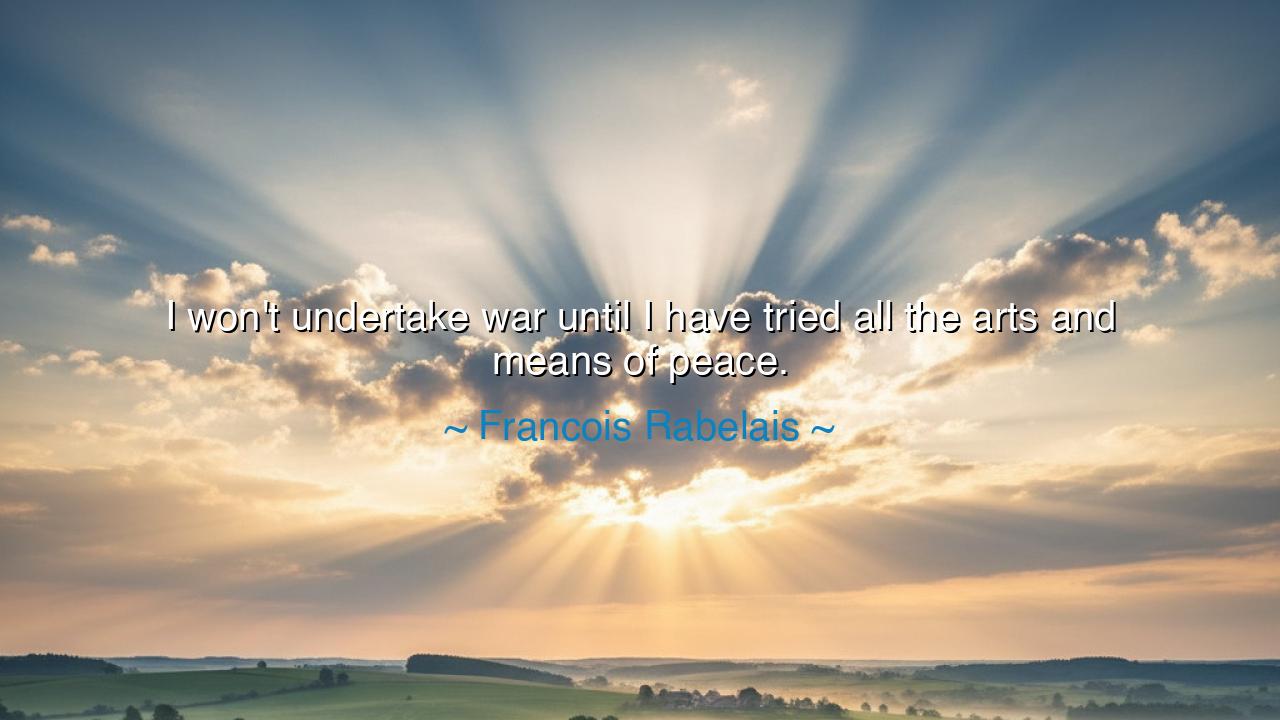
I won't undertake war until I have tried all the arts and means






The great French thinker, François Rabelais, spoke with the voice of wisdom when he declared: “I won’t undertake war until I have tried all the arts and means of peace.” These words, born in an age torn between the fires of conflict and the dawning of humanism, are more than mere counsel—they are a covenant with the soul of mankind. They remind us that though the sword glitters with might, it is the gentle hand of peace that preserves the dignity of humanity. In these words is not weakness, but the courage of restraint, the heroism of patience, and the greatness of one who knows that war may end bodies, but peace can mend hearts.
To understand the meaning, we must first see Rabelais not only as a satirist and scholar, but as a man who looked upon the folly of his age. France in his time was battered by strife, wars of kings, and the early tremors of religious division. He knew, as the ancients did, that war is easy to begin but nearly impossible to end without scars. By swearing to exhaust every art of peace before lifting arms, he placed himself in the lineage of wise leaders—men who valued life and the harmony of nations above the fleeting glory of conquest.
The quote is a beacon against the tide of human impatience. Many are quick to anger, to strike, to destroy, because such actions offer an immediate satisfaction. Yet the path of peace requires far more courage: the patience to negotiate, the humility to listen, the creativity to seek reconciliation where others see only division. It is the harder road, but the nobler one. War is the fire of destruction, peace is the seed of creation. Rabelais urges us to try all the seeds before we consent to burn the field.
History bears witness to the truth of his words. Recall Abraham Lincoln, who in the bloodiest hour of the American Civil War, sought peace with malice toward none and charity for all. He did not embrace the war lightly; he labored first with petitions, compromises, and appeals to reason. Only when those avenues were exhausted did war become unavoidable. And even then, his heart yearned for reunion, not vengeance. This is the spirit of Rabelais’s teaching: to fight only when the cause is just, and only after peace has been given every chance to prevail.
Contrast this with those who did not heed such wisdom. When nations rushed to arms in 1914, the Great War consumed millions, and Europe was left in ashes. Leaders had chosen pride and impatience over the “arts of peace,” and the price was unbearable. From their folly came lessons carved in stone and blood: that a war undertaken without exhausting peace first is not a triumph but a tragedy. Rabelais’s words, though centuries older, thunder like a prophecy across that battlefield.
What, then, is the lesson for us who are not kings or generals? It is this: in every conflict—whether among nations, communities, or within our own homes—we must first exhaust the ways of dialogue, empathy, and understanding. Do not rush to anger, for anger is a war of the heart. Try patience. Try compassion. Try forgiveness. These are the arts of peace that Rabelais spoke of. And if, after all these have failed, you must take a stand, let it be not with bitterness but with clarity, knowing you did all you could to preserve harmony.
Practically, we can live this teaching each day. When wronged, breathe before you strike back. When opposed, listen before you argue. When tempted to sever ties, first attempt to mend them. To do these things is not weakness—it is strength, for it requires mastery of the self. And mastery of the self is greater than mastery of enemies. For as the ancients said: he who conquers himself is mightier than he who conquers a city.
Thus Rabelais speaks across the centuries, his words a flame in the dark: “I won’t undertake war until I have tried all the arts and means of peace.” Let us not dismiss this as the musing of a bygone age, but as eternal counsel. Let it guide the leaders of nations, and also the leaders of households and hearts. For the fate of humanity rests not in the wars we win, but in the peace we preserve. The sword may protect us for a season, but only peace can endure forever.






AAdministratorAdministrator
Welcome, honored guests. Please leave a comment, we will respond soon